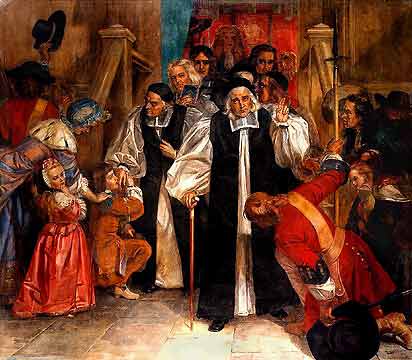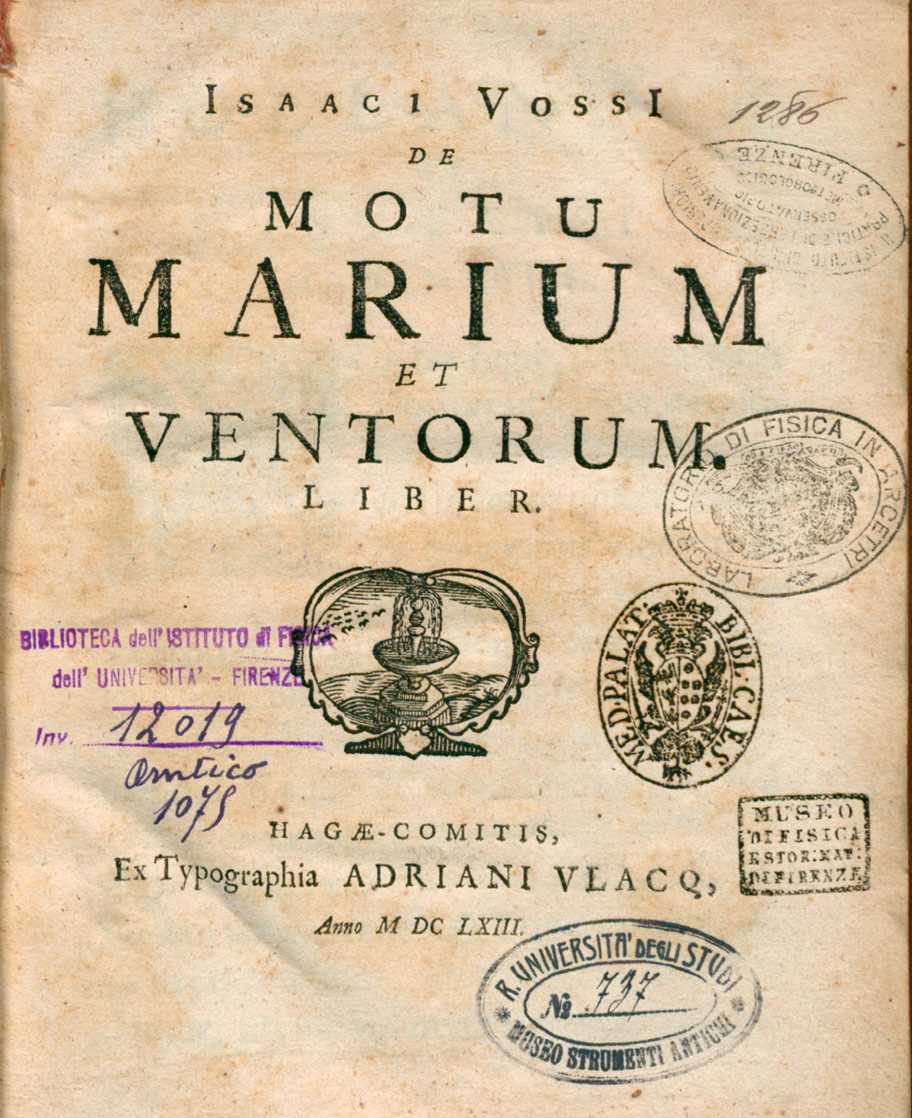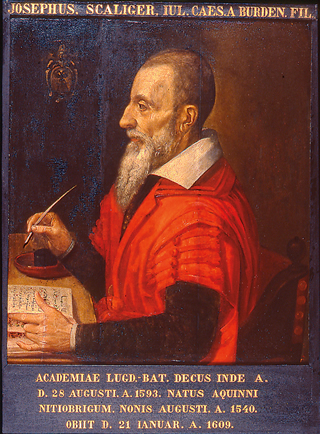|
John Milner (nonjuror)
John Milner (1628–1702) was an English clergyman, known as a nonjuring minister, scholar and opponent of John Locke. Life Milner was second son of John Milner and Mary, daughter of Gilbert Ramsden, born at Skircoat, in the parish of Halifax, and was baptised 10 February 1628. He was educated at the Halifax grammar school and entered at Christ's College, Cambridge, 21 June 1642. He probably left without a degree ahead of the parliamentary visitation of the university. Returning to Halifax he made the acquaintance of John Lake, whose sister he seems to have married. Milner was probably with Lake at Oldham in 1651; it has been inferred that he was schoolmaster at Chadderton appointed in August 1641. Lake's friend was preaching at Oldham as late as 1654. Milner is said to have subsequently returned to Halifax, and at the Restoration was given the curacy of Beeston in the parish of Halifax by Lake, who had then become vicar of Leeds. In 1662 he obtained the degree of B.D. at Cam ... [...More Info...] [...Related Items...] OR: [Wikipedia] [Google] [Baidu] |
Nonjuring Schism
The Nonjuring schism refers to a split in the State religion, established churches of England, Scotland and Ireland, following the deposition and exile of James II of England, James II and VII in the 1688 Glorious Revolution. As a condition of office, clergy were required to swear allegiance to the ruling monarch; for various reasons, some refused to take the oath to his successors William III of England, William III and II and Mary II of England, Mary II. These individuals were referred to as ''Non-juring'', from the Latin verb ''iūrō'', or ''jūrō'', meaning "to swear an oath". In the Church of England, an estimated 2% of priests refused to swear allegiance in 1689, including nine bishops. Ordinary clergy were allowed to keep their positions but after efforts to compromise failed, the six surviving bishops were removed in 1691. The schismatic Non-Juror Church was formed in 1693 when William Lloyd (bishop of Norwich), Bishop Lloyd appointed his own bishops. His action was opp ... [...More Info...] [...Related Items...] OR: [Wikipedia] [Google] [Baidu] |
James Duport
James Duport (; 1606, Cambridge17 July 1679, Peterborough) was an English classical scholar. Life His father, John Duport, who was descended from an old Norman family (the Du Ports of Caen, who settled in Leicestershire during the reign of Henry IV), was master of Jesus College, Cambridge. The son was educated at Westminster School and at Trinity College, where he became fellow and subsequently vicemaster. In 1639 he was appointed Regius Professor of Greek, in 1641 Archdeacon of Stow, in 1664 Dean of Peterborough, and in 1668 Master of Magdalene College. Works Through the Civil War, in spite of the loss of his clerical offices and eventually of his professorship, Duport continued his lectures. He is best known by his ''Homeri gnomologia'' (1660), a collection of all the aphorisms, maxims, and remarkable opinions in the ''Iliad'' and ''Odyssey'', illustrated by quotations from the Bible and classical literature. His other published works chiefly consist of translations (from th ... [...More Info...] [...Related Items...] OR: [Wikipedia] [Google] [Baidu] |
1628 Births
Sixteen or 16 may refer to: *16 (number), the natural number following 15 and preceding 17 *one of the years 16 BC, AD 16, 1916, 2016 Films * '' Pathinaaru'' or ''Sixteen'', a 2010 Tamil film * ''Sixteen'' (1943 film), a 1943 Argentine film directed by Carlos Hugo Christensen * ''Sixteen'' (2013 Indian film), a 2013 Hindi film * ''Sixteen'' (2013 British film), a 2013 British film by director Rob Brown Music *The Sixteen, an English choir *16 (band), a sludge metal band * Sixteen (Polish band), a Polish band Albums * ''16'' (Robin album), a 2014 album by Robin * 16 (Madhouse album), a 1987 album by Madhouse * ''Sixteen'' (album), a 1983 album by Stacy Lattisaw *''Sixteen'' , a 2005 album by Shook Ones * ''16'', a 2020 album by Wejdene Songs * "16" (Sneaky Sound System song), 2009 * "Sixteen" (Thomas Rhett song), 2017 * "Sixteen" (Ellie Goulding song), 2019 *"16", by Craig David from ''Following My Intuition'', 2016 *"16", by Green Day from ''39/Smooth'', 1990 *"16", by ... [...More Info...] [...Related Items...] OR: [Wikipedia] [Google] [Baidu] |
English Nonjuror Clergy
English usually refers to: * English language * English people English may also refer to: Peoples, culture, and language * ''English'', an adjective for something of, from, or related to England ** English national identity, an identity and common culture ** English language in England, a variant of the English language spoken in England * English languages (other) * English studies, the study of English language and literature * ''English'', an Amish term for non-Amish, regardless of ethnicity Individuals * English (surname), a list of notable people with the surname ''English'' * People with the given name ** English McConnell (1882–1928), Irish footballer ** English Fisher (1928–2011), American boxing coach ** English Gardner (b. 1992), American track and field sprinter Places United States * English, Indiana, a town * English, Kentucky, an unincorporated community * English, Brazoria County, Texas, an unincorporated community * Engli ... [...More Info...] [...Related Items...] OR: [Wikipedia] [Google] [Baidu] |
Andrew Pyle (philosopher)
Andrew Pyle (born 17 March 1955) is a British philosopher on the history of philosophical atomism. Pyle is professor Emeritus in Early Modern Philosophy at the University of Bristol, where he also received his doctorate. His dissertation was titled ''Atomism and its Critics: Democritus to Newton''. Pyle also writes on the history of science and has given talks within the university on the nature of science Science is a systematic endeavor that builds and organizes knowledge in the form of testable explanations and predictions about the universe. Science may be as old as the human species, and some of the earliest archeological evidence for ... historically. Pyle is one of the editors of the ''Continuum Encyclopedia of British Philosophy''. Andrew Pyle engaged in an apologetics debate with William Lane Craig in 2008 on the topic: Does the Christian God Exist? In 2018, Bristol University held an all day conference honouring the thematic themes of Pyle's research Publ ... [...More Info...] [...Related Items...] OR: [Wikipedia] [Google] [Baidu] |
Targum
A targum ( arc, תרגום 'interpretation, translation, version') was an originally spoken translation of the Hebrew Bible (also called the ''Tanakh'') that a professional translator ( ''mǝturgǝmān'') would give in the common language of the listeners when that was not Hebrew. This had become necessary near the end of the first century BC, as the common language was Aramaic and Hebrew was used for little more than schooling and worship. The translator frequently expanded his translation with paraphrases, explanations and examples, so it became a kind of sermon. Writing down the targum was initially prohibited; nevertheless, some targumitic writings appeared as early as the middle of the first century AD. They were not then recognized as authoritative by the religious leaders. Some subsequent Jewish traditions (beginning with the Babylonian Jews) accepted the written targumim as authoritative translations of the Hebrew scriptures into Aramaic. Today, the common meaning of '' ... [...More Info...] [...Related Items...] OR: [Wikipedia] [Google] [Baidu] |
Robert Jenkin (theologian)
Robert Jenkin (31 January 1656 – 7 April 1727) was an English clergyman, a nonjuror of 1698, later Master of St John's College, Cambridge, Lady Margaret's Professor of Divinity, and opponent of John Locke. Life He was son of Thomas and Mary Jenkin of the Isle of Thanet, Kent, baptised in the parish of Minster on 31 January 1656. He was educated in the King's School, Canterbury, and at St John's College, Cambridge. He graduated B.A. in 1678; was admitted a fellow of St John's on the foundress's foundation 30 March 1680; and proceeded M.A. in 1681. After taking orders he was collated by Bishop Francis Turner to the vicarage of Waterbeach, Cambridgeshire, which he held with his fellowship. He also became chaplain to Bishop John Lake of Chichester, who collated him 1688 to the precentorship of Chichester Cathedral. He was one of the subscribers to Bishop Lake's declaration on his deathbed (27 August 1689) of his adherence to the doctrines of the Church of England, part of which c ... [...More Info...] [...Related Items...] OR: [Wikipedia] [Google] [Baidu] |
Socinianism
Socinianism () is a nontrinitarian belief system deemed heretical by the Catholic Church and other Christian traditions. Named after the Italian theologians Lelio Sozzini (Latin: Laelius Socinus) and Fausto Sozzini (Latin: Faustus Socinus), uncle and nephew, respectively, it was developed among the Polish Brethren in the Polish Reformed Church during the 16th and 17th centuries and embraced by the Unitarian Church of Transylvania during the same period. It is most famous for its Non-trinitarian Christology but contains a number of other heretical beliefs as well. Origins The ideas of Socinianism date from the wing of the Protestant Reformation known as the Radical Reformation and have their root in the Italian Anabaptist movement of the 1540s, such as the anti-trinitarian Council of Venice in 1550. Lelio Sozzini was the first of the Italian anti-trinitarians to go beyond Arian beliefs in print and deny the pre-existence of Christ in his ''Brevis explicatio in primum Johannis c ... [...More Info...] [...Related Items...] OR: [Wikipedia] [Google] [Baidu] |
Isaac Vossius
Isaak Vossius, sometimes anglicised Isaac Voss (1618 in Leiden – 21 February 1689 in Windsor, Berkshire) was a Dutch scholar and manuscript collector. Life He was the son of the humanist Gerhard Johann Vossius. Isaak formed what was accounted the best private library in the world (Massil 2003). He had a contemporary reputation for eccentricity, refusing the sacrament on his deathbed, it was reported, until reminded that to do so would reflect unfavorably on the canons of St George's Chapel, Windsor Castle, to which chapter he belonged. He was raised in the atmosphere of a scholarly household, familiar with Greek, ancient geography, and Arabic from an early age. In 1641, he undertook a European tour, in which he visited England, France and Italy (notably Florence), making the acquaintance of scholars of the elder generation such as James Ussher and Hugo Grotius and beginning his lifelong collecting of manuscripts and books before he returned to Amsterdam in 1644 to take ... [...More Info...] [...Related Items...] OR: [Wikipedia] [Google] [Baidu] |
Robert Cary (chronologist)
Robert Cary (1615?–1688) was an English churchman, for a short while archdeacon of Exeter, known as a chronologist. Life Born at Cockington or Berry Pomeroy, Devon, he was the second son of George Cary of Cockington, and Elizabeth, daughter of Sir Edward Seymour. He was admitted a commoner of Exeter College, Oxford on 4 October 1631. He became a scholar of Corpus Christi College, Oxford in October 1634, and graduated B.A. 1635, M.A. 1638–9. He was probably fellow of his college. His kinsman, William Seymour, Marquess of Hertford, who was chancellor of the university, obtained for him the degree of D.C.L. in November 1644; and later promoted him to the rectory of Portlemouth, near Kingsbridge. Cary became intimate with the local presbyterians and was made moderator of his division of the county. On the Restoration, however, he was one of the first to congratulate the king, and was installed archdeacon of Exeter on 18 August 1662. He gave up his preferment, feeling threatened ... [...More Info...] [...Related Items...] OR: [Wikipedia] [Google] [Baidu] |
James Ussher
James Ussher (or Usher; 4 January 1581 – 21 March 1656) was the Church of Ireland Archbishop of Armagh and Primate of All Ireland between 1625 and 1656. He was a prolific scholar and church leader, who today is most famous for his identification of the genuine letters of the church father, Ignatius of Antioch, and for his chronology that sought to establish the time and date of the creation as "the entrance of the night preceding the 23rd day of October... the year before Christ 4004"; that is, around 6 pm on 22 October 4004 BC, per the proleptic Julian calendar. Education Ussher was born in Dublin to a well-to-do family. His maternal grandfather, James Stanihurst, had been speaker of the Irish parliament. Ussher's father, Arland Ussher, was a clerk in chancery who married James Stanihurst's daughter, Margaret (by his first wife Anne Fitzsimon), who was reportedly a Roman Catholic. Ussher's younger and only surviving brother, Ambrose, became a distinguished scholar o ... [...More Info...] [...Related Items...] OR: [Wikipedia] [Google] [Baidu] |
Joseph Scaliger
Joseph Justus Scaliger (; 5 August 1540 – 21 January 1609) was a French Calvinist religious leader and scholar, known for expanding the notion of classical history from Greek and Ancient Roman history to include Persian, Babylonian, Jewish and Ancient Egyptian history. He spent the last sixteen years of his life in the Netherlands. Early life In 1540, Scaliger was born in Agen, France, to Italian scholar and physician Julius Caesar Scaliger and his wife, Andiette de Roques Lobejac. His only formal education was three years of study at the College of Guienne in Bordeaux, which ended in 1555 due to an outbreak of the bubonic plague. Until his death in 1558, Julius Scaliger taught his son Latin and poetry; he was made to write at least 80 lines of Latin a day. University and travels After his father's death, Scaliger spent four years at the University of Paris, where he studied Greek under Adrianus Turnebus. After two months he found he was not in a position to profit ... [...More Info...] [...Related Items...] OR: [Wikipedia] [Google] [Baidu] |





